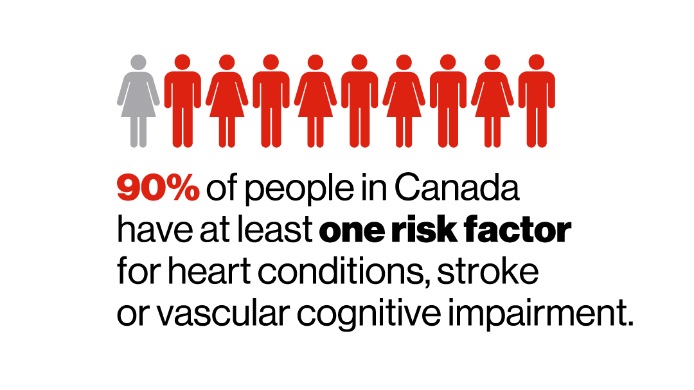Protect your health
Do you have any of these conditions?
- Heart disease
- Stroke or mini-strokes (also called transient ischemic attacks or TIAs)
- Challenges with your thought processes caused by problems with the blood vessels in your brain (vascular cognitive impairment or dementia in its most severe form)
Did you know that if you have one of these three conditions you have a higher risk of developing the other conditions? But if you prevent one condition, you can prevent many others too. And you can start now.

You are not alone. Most people in Canada (nine out of 10) have at least one risk factor for heart disease, stroke or vascular cognitive impairment.
What can you do?
- Know your personal risk factors for heart disease, stroke and vascular cognitive impairment. Below is a list of the most common risk factors.
- Reduce your own risk by making healthy lifestyle choices.
- If you have a heart condition, have had a stroke or have vascular cognitive impairment, you might benefit from extra medical follow-up. Share this web page with your doctor. Explain that you know it is important to be checked out and have your risk assessed for the other two conditions. Patients and their family members, are their own strongest health advocates.
- Know the emergency signs of a heart attack, cardiac arrest or stroke.
Risk factors
Heart disease, stroke and vascular cognitive impairment have many risk factors in common. If you have any one of these conditions, it may be considered an additional risk factor for other heart and brain conditions.

In the list below, check the risk factors that could apply to you. Share this with your family doctor or another member of your healthcare team. Talk to them about the lifestyle changes that will benefit you the most.
Health conditions that are risk factors
- high blood pressure
- high blood pressure during pregnancy (pre-eclampsia)
- high cholesterol
- diabetes
- heart conditions
- angina
- heart attack
- heart failure
- heart rhythm problems, such as atrial fibrillation, ventricular tachycardia, cardiac arrest
- heart valve disease
- congenital heart disease
- stroke
- mini-stroke (transient ischemic attack or TIA)
- cognitive decline (such as difficulty with your memory) caused by problems with the blood vessels in your brain
- unhealthy diet
- not enough physical activity
- unhealthy weight
- smoking (including cannabis)
- too much alcohol
- birth control or hormone replacement therapy
- recreational drug use
- stress
Risk factors you cannot control
- age – the older you are, the higher your risk
- sex – a woman’s risk of heart disease and stroke changes over her lifetime
- South Asian or African heritage
- Indigenous heritage
- family history of heart disease, stroke or TIA, or vascular cognitive impairment
- personal circumstances – challenges accessing healthy food, safe drinking water, health services and social services
Make healthy lifestyle choices
If you already have one condition, you can reduce your risk of further health problems by making healthy lifestyle choices such as quitting smoking, losing weight and exercising regularly. But change can be hard – especially lifestyle changes. Learn the steps to making lifestyle changes with our help.
Work with your doctor
Be a partner in your healthcare. Here are some tips to help you work with your family doctor or your healthcare team.
- If you have a heart condition, have had a stroke, or have vascular cognitive impairment, ask your healthcare provider to explain your condition clearly. When they are done, repeat the key points – in your own words – back to them. This is called the “teach-back method”. It will help you to understand and remember the information.
- Before medical appointments, make a list of your questions. Put them in order – starting with the most important. Leave a space for you to write the answer.
- Many people ask a family member or friend to come to their medical appointments. They can be a second set of ears. Give them a copy of your list of questions and ask them to take notes.
- If your healthcare team recommends a treatment, ask if they have any tools to help you think through the benefits and risks of the treatment. One simple strategy is to make a pros and cons list for each option. Take your time and decide what is right for you. (See below for a list of decision aids.)
- Know your numbers. Your healthcare team uses numbers as one way to track your health – numbers such as your blood pressure reading and your blood test results. Talk to your team about the targets they feel are right for you. Ask about your results and track your progress.
- At any time, you can search our website to learn more about heart disease, stroke or vascular cognitive impairment.
Connecting with other people who know what you are going through can help the recovery journey. Our Community of Survivors can connect you with a support group of people living with heart disease or who have had a stroke.
Know the emergency signs of a heart attack, cardiac arrest or stroke
Signs can vary and may be different for men and women. If you experience any of the signs, call 9-1-1 or your local emergency number immediately.
Related information
- Dis(connected): How unseen links are putting us at risk
(Interactive version) (PDF) - Your Stroke Journey (PDF)
- Living Well with Heart Disease (PDF)
- Heart failure resources
- Talking to your doctor (PDF)
- A-Z list of decision aids (Ottawa Heart Research Institute)
